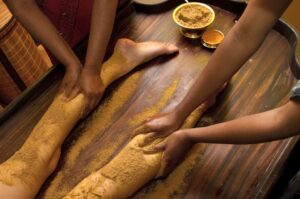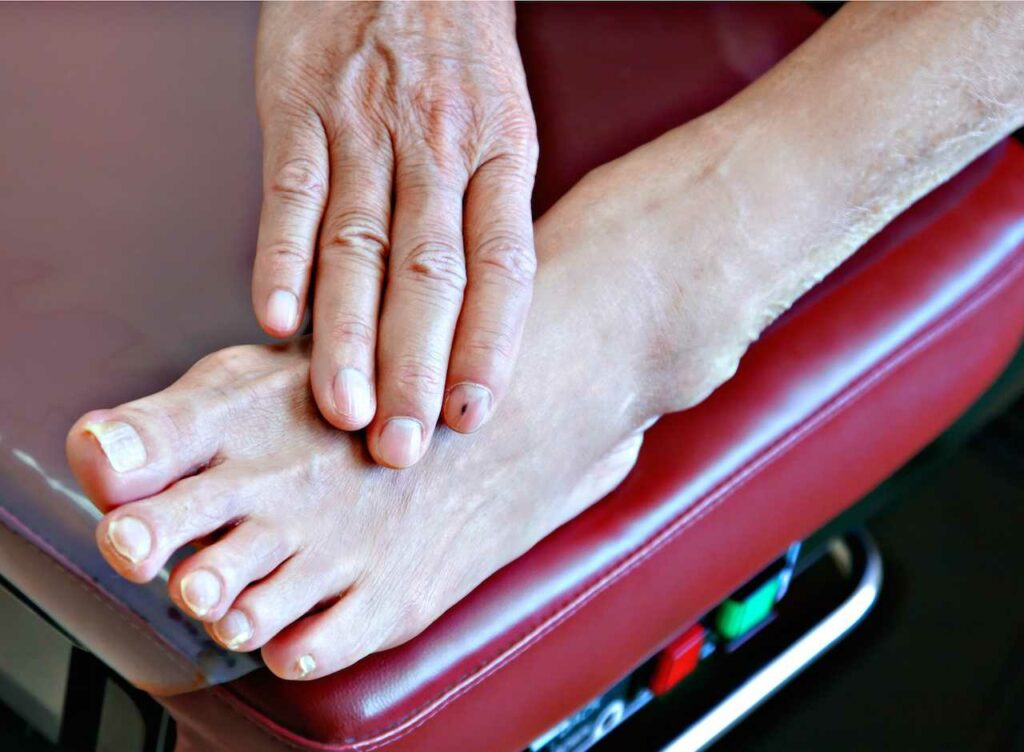Diabetic neuropathy, a common complication of diabetes, affects millions worldwide, causing nerve damage that leads to pain, numbness, and a host of other symptoms. Ayurveda, an ancient Indian system of medicine, offers a holistic approach to managing this condition. This blog delves into the principles and the unique perspective on diabetic neuropathy treatment in Ayurveda. We will explore how this time-honored practice can complement modern treatments and offer natural remedies, and lifestyle changes.
Contents
What Is The Diabetic Neuropathy Treatment In Ayurveda?
 Diabetic neuropathy treatment in Ayurveda involves a holistic approach that includes dietary changes, herbal remedies, lifestyle modifications, and specific therapies aimed at balancing the body’s doshas (vital energies) and improving overall health. Here are some key components of Ayurvedic treatment for diabetic neuropathy:
Diabetic neuropathy treatment in Ayurveda involves a holistic approach that includes dietary changes, herbal remedies, lifestyle modifications, and specific therapies aimed at balancing the body’s doshas (vital energies) and improving overall health. Here are some key components of Ayurvedic treatment for diabetic neuropathy:
Dietary Adjustments
For diabetic neuropathy, a diet that helps in balancing blood sugar levels is crucial. Ayurvedic dietary recommendations typically include the consumption of bitter herbs and vegetables like bitter gourd and fenugreek. These are believed to have properties that aid in regulating blood glucose levels. Complex carbohydrates found in whole grains and fiber-rich foods are encouraged as they are digested slowly and help in maintaining steady blood sugar levels.
Fresh vegetables, particularly leafy greens, are also a staple in this diet. Processed foods, simple sugars, and excessive carbohydrates are discouraged as they can spike blood sugar levels, exacerbating diabetic conditions and consequently, neuropathy.
Herbal Remedies
Ayurveda uses a variety of herbs known for their medicinal properties in managing symptoms of diabetic neuropathy. Turmeric, with its potent anti-inflammatory properties, is often used to alleviate pain and inflammation associated with nerve damage. Guduchi is another herb favored for its ability to help regulate blood sugar levels. Ashwagandha is recommended for its stress-reducing effects and potential benefits in improving nerve function. Shilajit, a mineral-rich compound, is believed to rejuvenate and facilitate the body’s natural healing processes.
Yoga and Exercise
Regular physical activity is essential in managing diabetes and its complications, including neuropathy. In Ayurveda, specific yoga asanas are recommended to improve blood circulation, reduce stress, and enhance glucose metabolism. Gentle stretching exercises, as part of yoga, can help in maintaining flexibility and reducing neuropathic pain. Pranayama, or controlled breathing exercises, are also a key part of the regimen, known for their ability to calm the mind and reduce stress. This is particularly beneficial for neuropathic patients.
Panchakarma Therapy
 Panchakarma, a cornerstone of Ayurvedic treatment, involves a series of cleansing and rejuvenation procedures designed to detoxify the body and balance the doshas. For diabetic neuropathy, treatments like Vasti (medicated enemas) are believed to be effective in cleansing the body of toxins and restoring doshic balance. Other therapies like herbal steam baths and oil massages may also be included, tailored to the individual’s specific needs and health status.
Panchakarma, a cornerstone of Ayurvedic treatment, involves a series of cleansing and rejuvenation procedures designed to detoxify the body and balance the doshas. For diabetic neuropathy, treatments like Vasti (medicated enemas) are believed to be effective in cleansing the body of toxins and restoring doshic balance. Other therapies like herbal steam baths and oil massages may also be included, tailored to the individual’s specific needs and health status.
Massage and External Therapies
Ayurvedic massage (Abhyanga) using specific herbal oils is a common treatment for diabetic neuropathy. These massages are believed to improve blood circulation, reduce pain and numbness, and promote overall well-being. The oils, often infused with specific herbs, are chosen based on the individual’s doshic constitution and the specific symptoms of neuropathy they are experiencing.
Rasayana Therapy
This involves the use of specific Ayurvedic formulations aimed at rejuvenating the body and strengthening the immune system. In the context of chronic conditions like diabetes and its complications, Rasayana therapy is believed to help restore the body’s natural balance and vitality. These formulations are often customized by an Ayurvedic practitioner based on the individual’s specific health needs and the progression of their condition.
Which Ayurvedic Medicine Is Best For Diabetic Nephropathy?
In Ayurveda, the treatment of diabetic nephropathy, a complication of diabetes affecting the kidneys, involves the use of various herbs and herbal formulations. Here are some Ayurvedic remedies often recommended for diabetic nephropathy:
- Chandraprabha Vati
This is a classical Ayurvedic formulation that is commonly used for urinary tract disorders and is believed to be beneficial for kidney health. It is thought to help in detoxifying the kidneys and improving their function.
- Gokshura (Tribulus terrestris)
Known for its diuretic properties, Gokshura is often used in Ayurvedic medicine to support kidney and urinary tract health. It is believed to help in managing the symptoms of nephropathy and improving kidney function.
- Punarnava (Boerhavia diffusa)
This herb is traditionally used for its diuretic and rejuvenating properties. Punarnava is believed to be effective in reducing swelling and fluid retention. It can be beneficial in cases of kidney disease.
- Varun (Crataeva nurvala)
Varun is another herb that is commonly used in Ayurvedic medicine for urinary and kidney disorders. It is thought to help in reducing inflammation and improve the health of the kidneys.
- Guduchi (Tinospora cordifolia)
Known for its immunomodulatory and anti-inflammatory properties, Guduchi is often recommended for its potential to improve overall health and support kidney function.
- Shilajit
This mineral-rich substance is believed to have rejuvenating properties. And is often used in combination with other herbs to support kidney health.
It’s important to remember that the effectiveness of these remedies can vary from person to person. Thus, they should not replace conventional medical treatments for diabetic nephropathy. It’s also crucial to consult with a healthcare provider before starting any new treatment to ensure it is safe and appropriate for your specific health condition.
What Are The Benefits Of Diabetic Neuropathy Treatment In Ayurveda?
 Diabetic neuropathy treatment in Ayurveda offers several benefits, particularly because of its holistic approach to health and wellness. Here are some of the key advantages:
Diabetic neuropathy treatment in Ayurveda offers several benefits, particularly because of its holistic approach to health and wellness. Here are some of the key advantages:
Holistic Management
Ayurveda looks at the patient as a whole, not just the disease. This approach helps in addressing the root cause of diabetic neuropathy. It often lies in the overall imbalance of the body’s systems, rather than just treating the symptoms.
Natural Remedies
Ayurveda utilizes natural herbs, plants, and minerals, reducing the likelihood of side effects often associated with conventional medications. These natural remedies are believed to have multiple health benefits beyond just treating neuropathy.
Improvement in Blood Sugar Control
Many Ayurvedic practices, including dietary changes and herbal treatments, aim at better regulation of blood sugar levels. This is fundamental in managing diabetes and preventing or slowing the progression of neuropathy.
Reduced Pain and Discomfort
Ayurvedic treatments can help alleviate symptoms of neuropathy like pain, burning, and numbness. Techniques such as massage and specific herbal remedies can provide symptomatic relief.
Enhanced Circulation
Practices such as yoga and Ayurvedic massage (Abhyanga) improve circulation. This is vital in managing diabetic neuropathy. Better blood flow can aid in nerve repair and reduce symptoms.
Stress Reduction
Ayurvedic practices such as meditation, yoga, and pranayama (breathing exercises) are effective in reducing stress. It can exacerbate diabetic neuropathy. Stress management is an essential aspect of controlling blood sugar levels and improving overall quality of life.
Preventive Approach
Ayurveda not only helps in treating diabetic neuropathy but also works as a preventive measure by addressing the early signs of imbalance in the body’s systems.
Complementary to Conventional Treatments
Ayurvedic treatments for diabetic neuropathy can be used in conjunction with conventional medical treatments. And, providing a more comprehensive approach to managing the condition.
While Ayurvedic treatments offer several benefits, it’s important to approach them as a complementary therapy rather than a standalone treatment for diabetic neuropathy. It’s essential to consult with healthcare providers, both in the Ayurvedic and medical fields, to ensure a safe and coordinated approach to treatment, especially given the complexities of managing diabetes.
Conclusion
In conclusion, diabetic neuropathy treatment in Ayurveda offers a unique and holistic approach to managing diabetic neuropathy. And, focusing on natural remedies, dietary changes, lifestyle modifications, and stress reduction techniques. By addressing the root causes of the condition and not just the symptoms, Ayurvedic treatment can help improve blood sugar control, alleviate pain and discomfort, enhance circulation, and promote overall well-being.
Always consult with healthcare professionals before embarking on any new treatment plan to ensure it aligns safely with your health needs. Do you want to get rid of diabetes? Join our online diabetes treatment program and reverse Diabetes naturally through lifestyle changes such as a Personalized Diet plan, Exercise, Yoga, dieticians, and health coaches.

